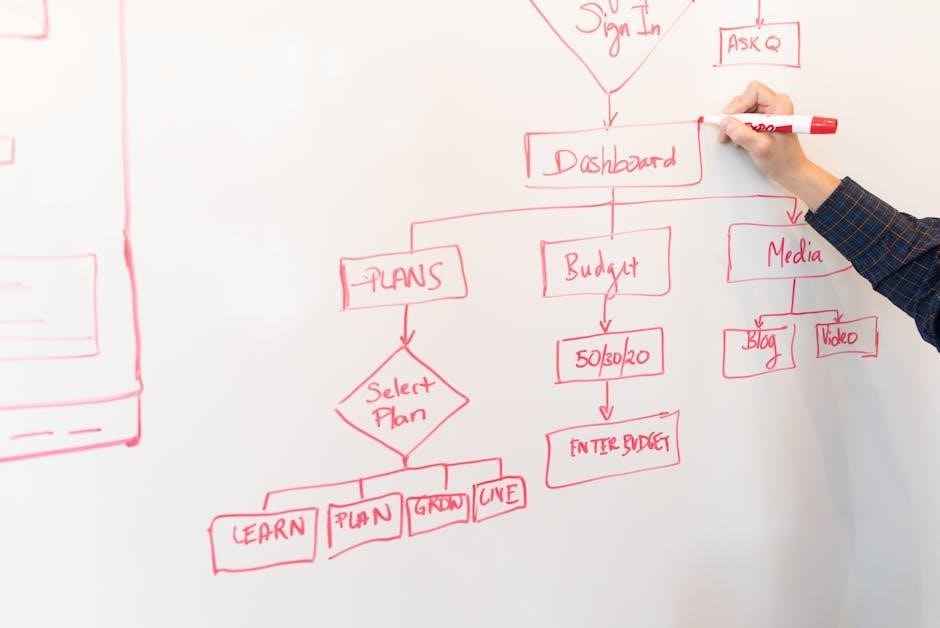The Curriculum and Instruction Certificate is a specialized program designed to enhance educators’ skills in developing and implementing effective teaching strategies and curriculum designs․
1․1 Definition and Overview
The Curriculum and Instruction Certificate is a professional credential focusing on curriculum design, instructional strategies, and educational leadership․ It equips educators with advanced skills to develop and implement effective teaching methods, aligning with modern educational standards and fostering student-centered learning environments․
- It emphasizes practical application of theoretical knowledge;
- Targets educators seeking to enhance teaching effectiveness․
1․2 Importance in Modern Education
The Curriculum and Instruction Certificate is crucial in modern education as it addresses the need for adaptive, student-centered teaching methods․ It equips educators to design curricula that meet diverse learning needs, integrate technology, and align with contemporary educational standards, ensuring effective and engaging instruction for all students․

Key Concepts and Principles
This section explores foundational elements of curriculum and instruction, including curriculum design, instructional strategies, and assessment techniques, essential for modern educational practices․
2․1 Curriculum Design and Development
Curriculum design involves creating structured educational frameworks aligned with learning objectives․ This process includes defining goals, selecting content, and organizing lessons to ensure coherence and effectiveness in teaching and learning environments․ Effective design also considers diverse learner needs and integrates assessments to measure student progress successfully․
2․2 Instructional Strategies and Methods
Instructional strategies and methods focus on effective teaching practices that engage students and promote active learning․ Techniques include project-based learning, differentiated instruction, and technology integration, which cater to diverse learning styles and enhance student engagement while fostering deeper understanding of subject matter and critical thinking skills in educational settings․ These methods ensure learner-centered approaches are prioritized․
2․3 Assessment and Evaluation Techniques
Assessment and evaluation techniques are crucial for measuring student learning outcomes and instructional effectiveness․ These methods include formative and summative assessments, data-driven practices, and technology-integrated tools to monitor progress and inform teaching strategies, ensuring alignment with curriculum goals and fostering continuous improvement in educational settings and student achievement․
Benefits of Obtaining the Certificate
Obtaining the Curriculum and Instruction Certificate enhances teaching skills, offers career advancement, and improves student learning outcomes, equipping educators with innovative strategies and tools for modern classrooms․
3․1 Enhanced Teaching Skills
The Curriculum and Instruction Certificate equips educators with research-based strategies and best practices, enabling them to create engaging lessons and adapt instruction to diverse learner needs․ Participants gain practical tools to align curriculum with learning objectives, integrate technology, and implement data-driven practices, fostering a more effective and impactful teaching approach in the classroom․
3․2 Career Advancement Opportunities
Earning a Curriculum and Instruction Certificate opens doors to leadership roles, such as curriculum specialists, instructional coaches, and educational consultants․ It positions educators for career advancement, enabling them to specialize in curriculum design, instructional strategies, and educational leadership, while enhancing their credibility and marketability in the competitive education sector․
3․3 Improved Student Learning Outcomes
The Curriculum and Instruction Certificate equips educators with strategies to enhance student learning outcomes by aligning curriculum with objectives, creating engaging lessons, and using data-driven practices․ It fosters inclusivity, critical thinking, and personalized learning, ensuring students meet academic goals and develop essential skills for future success․

Target Audience
The Curriculum and Instruction Certificate is tailored for educators seeking advanced teaching strategies, aspiring instructional leaders, and education administrators aiming to enhance their expertise in curriculum design and implementation․
4․1 Current Educators
Current educators benefit from the Curriculum and Instruction Certificate by gaining advanced strategies to enhance teaching practices, refine curriculum design, and implement innovative instructional methods; This program equips them with practical skills to address diverse learner needs, integrate technology, and align teaching with modern educational standards, ensuring impactful and engaging classroom experiences․
4․2 Aspiring Instructional Leaders
The Curriculum and Instruction Certificate is ideal for educators aiming to transition into leadership roles․ It provides foundational knowledge in curriculum development, instructional strategies, and educational leadership, enabling aspiring leaders to effectively guide schools in improving teaching practices and student outcomes․
4․3 Education Administrators
Educational administrators can benefit from the Curriculum and Instruction Certificate by gaining advanced knowledge in curriculum development, instructional leadership, and educational program management․ This certification helps administrators align curriculum with institutional goals, fostering improved teaching practices and student success through data-driven decision-making and innovative educational strategies․

Program Structure and Content
The program combines core courses, electives, and practical workshops, focusing on curriculum design, instructional strategies, and technology integration to prepare educators for modern classroom challenges and innovative teaching approaches․
5․1 Core Courses and Electives
Core courses focus on curriculum design, instructional strategies, and educational research, while electives allow specialization in areas like technology integration or diverse learning needs, preparing educators to adapt to evolving educational demands and enhance teaching effectiveness through tailored learning experiences․
5․2 Practical Training and Workshops
Practical training and workshops provide hands-on experiences, enabling educators to apply curriculum design and instructional strategies in real-world settings․ These sessions often include interactive activities, case studies, and collaborative projects, ensuring educators can effectively implement innovative teaching methods and adapt to diverse learning environments while staying updated on best practices in education․
5․4 Integration of Technology in Education
The integration of technology in education enhances curriculum design and instructional strategies, offering interactive and immersive learning experiences․ Educators learn to utilize digital tools, such as learning management systems and multimedia resources, to create personalized and engaging lessons, fostering innovation and preparing students for a tech-driven future while improving learning outcomes․

Career Opportunities Post-Certification
Earning a Curriculum and Instruction Certificate opens doors to roles like Curriculum Specialist, Instructional Coach, and Educational Consultant․ These positions leverage skills in curriculum design, instructional strategies, and leadership, enabling educators to drive innovation and improvement in educational settings․
6;1 Curriculum Specialist Roles
Curriculum Specialists design and implement educational programs, ensuring alignment with standards․ They collaborate with educators, assess program effectiveness, and stay updated on educational trends to enhance student outcomes and institutional goals, playing a pivotal role in shaping academic success and innovation in schools․
6․2 Instructional Coach Positions
Instructional Coaches work with teachers to enhance teaching methods and student learning․ They provide professional development, support curriculum implementation, and foster a collaborative school culture․ Coaches help educators refine their practices, align instruction with standards, and integrate innovative strategies, ultimately improving educational outcomes and teacher effectiveness․
6;3 Educational Consultant Opportunities
Educational consultants advise schools and organizations on curriculum design, instructional strategies, and policy implementation․ With a Curriculum and Instruction Certificate, professionals can offer expert guidance, enhancing teaching methodologies and student outcomes․ This role is ideal for those passionate about innovation in education and improving learning experiences across various settings․
Certification Process and Requirements
The certification process involves meeting admission criteria, completing coursework, and maintaining credentials through ongoing professional development․ Requirements vary by institution, ensuring flexibility and accessibility for diverse learners․
7․1 Admission Requirements
Admission typically requires a bachelor’s degree, minimum GPA, transcripts, and teaching experience․ Some programs may demand letters of recommendation, personal statements, or prerequisite courses․ Requirements vary by institution, ensuring accessibility for diverse applicants․ Additional documentation, like test scores, may be needed for certain programs․
7․2 Program Duration and Format
The Curriculum and Instruction Certificate typically spans 12-18 months, depending on the institution․ Formats vary, with options for online, hybrid, or on-campus learning․ Many programs are designed for working educators, offering flexible pacing and self-paced courses to accommodate professional commitments․
7․3 Certification Maintenance and Renewal
Certification typically requires renewal every 1-5 years, depending on the provider․ Maintenance involves continuing education, professional development, or demonstrating ongoing competency․ Some programs may require additional coursework, workshops, or leadership activities to ensure educators stay current with evolving educational practices and standards․

Impact on Student Learning
The curriculum and instruction certificate equips educators to align learning objectives, create engaging lessons, and use data-driven practices, leading to improved student outcomes and academic success․
8․1 Aligning Curriculum with Learning Objectives
Aligning curriculum with learning objectives ensures that educational content is relevant, coherent, and tailored to meet specific outcomes․ This approach enhances the effectiveness of instruction, making it easier for students to achieve their academic goals and develop essential skills for future success․
8․2 Creating Engaging and Inclusive Lessons
Creating engaging and inclusive lessons involves tailoring instruction to diverse student needs, fostering a supportive environment, and using varied teaching strategies․ This approach ensures all students, regardless of background or ability, feel valued and have opportunities to participate actively in learning․
8․3 Data-Driven Instructional Practices
Data-driven instructional practices involve using student performance data to inform teaching strategies․ By regularly assessing needs, tracking progress, and adjusting methods, educators can optimize learning outcomes․ This approach ensures decisions are grounded in evidence, leading to more effective and targeted instruction for all students․
Popular Institutions Offering the Certificate
Leading universities like Harvard, University of Pennsylvania, and MIT offer renowned curriculum and instruction certificate programs․ Online platforms such as Coursera and edX also provide accessible options for educators worldwide․
9․1 Universities with Renowned Programs
Harvard University, University of Pennsylvania, and MIT are prominent institutions offering esteemed curriculum and instruction certificate programs․ These universities provide rigorous coursework, innovative research opportunities, and expert faculty guidance, equipping educators with advanced teaching strategies and curriculum development skills to excel in their professional careers․
9․2 Online Platforms and Distance Learning Options
Online platforms like Coursera, edX, and edWeb․net offer flexible curriculum and instruction certificate programs․ These platforms provide accessible, high-quality education, allowing educators to enhance their skills remotely․ Many universities, such as Harvard and MIT, offer online courses, ensuring affordability and convenience for working professionals seeking career advancement and continuous learning opportunities․
9․4 Success Stories from Graduates
Graduates of the curriculum and instruction certificate program often share stories of enhanced teaching methods and career growth․ Many report improved student engagement and academic outcomes, while others highlight promotions to leadership roles such as instructional coaches or educational consultants, inspiring others to pursue similar professional development opportunities․

Continuous Professional Development
Continuous professional development ensures educators stay updated with educational trends, fostering lifelong learning and skill enhancement while providing networking opportunities to collaborate and share innovative teaching practices․
10․1 Staying Updated with Educational Trends
Educators can stay informed about the latest teaching methodologies and technologies by utilizing advanced Google search techniques, exploring educational blogs, and leveraging online platforms like MIT OpenCourseWare and ISTE standards to refine their professional skills and adapt to evolving educational landscapes effectively․
10․2 Lifelong Learning and Skill Enhancement
Lifelong learning involves continuous professional development through advanced search techniques and leveraging resources like MIT OpenCourseWare and ISTE standards․ Educators refine their skills by accessing updated materials, exploring innovative teaching strategies, and applying best practices to enhance curriculum design and instructional effectiveness in their classrooms․
10․3 Networking Opportunities with Peers
Networking opportunities with peers through platforms like edWeb․net and MIT OpenCourseWare foster professional growth․ Educators connect, share ideas, and explore innovative strategies, enhancing collaboration and innovation in curriculum design and instructional practices․
The Curriculum and Instruction Certificate equips educators to thrive in an evolving educational landscape․ By fostering innovation and continuous learning, it prepares professionals to lead and inspire future generations effectively․
11․1 The Evolving Landscape of Education
Education is rapidly transforming due to technological advancements and shifting learning needs․ The Curriculum and Instruction Certificate addresses these changes by equipping educators with innovative strategies to adapt to modern classroom demands, ensuring they remain at the forefront of educational progress and innovation․
11․2 The Role of Curriculum and Instruction Specialists
Curriculum and Instruction Specialists play a crucial role in shaping educational programs by designing curricula, implementing effective instructional strategies, and assessing program outcomes․ They collaborate with educators to enhance teaching methods, ensuring alignment with learning objectives and fostering improved student outcomes through evidence-based practices and continuous professional development opportunities․
11․3 Encouraging Others to Pursue Certification
Encouraging educators to pursue a Curriculum and Instruction Certificate can significantly enhance their teaching skills and career growth․ This certification equips them with evidence-based practices, fostering improved student outcomes․ With flexible online platforms and continuous professional development opportunities, it’s an ideal path for those committed to educational excellence and innovation․
